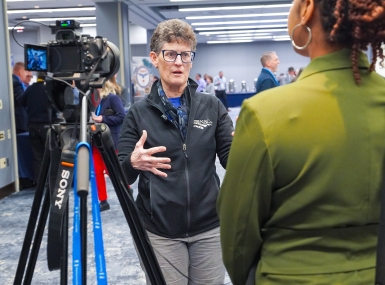Counties advance early childhood initiatives in challenging times

The dynamic landscape of early childhood education, shaped by the social, political and economic climate pose new challenges for families and local leadership. Counties continue to navigate these challenges and remain committed to supporting local children and families.
County-led prenatal-to-3 (PN-3) strategies are emerging as powerful tools to strengthen the foundation for lifelong health, learning and success.
During the first few years of life, brains establish 1 million new neural pathways per second; shaping educational readiness, behavior and overall growth. Counties have embraced the call to invest in robust early childhood education programs that set children on a path to thrive. Ensuring families and children have long-term access to education programs and services is at the forefront of county priorities.
For Waukesha County, Wis. Supervisor Larry Nelson, children losing access to services is a key concern.
“Once the child turns 3, they lose all county supports, which can be unsettling to a family embarking on the transition to a school setting,” he said.
Funding hurdles
Counties continue to grapple with funding shortfalls as state and federal funding for local governments dwindle. Counties often shoulder the financial responsibility of education initiatives. Financial constraints and disproportionate financial commitments at all government levels hinder local leaders’ efforts to reach all families.
Waukesha County’s fiscal innovation
Sharing services among counties, local organizations, health departments and educational institutions streamlines counties’ ability to deliver programs and services to children and their families. Sharing services boosts the quality of services delivered, preserves financial viability and makes programs more accessible to families and children.
Waukesha County demonstrates this approach through its partnership with Lutheran Social Services and the Wisconsin Department of Health and Human Services for its Birth to 3 Program (B-3). Joint government funding allows the program to serve families and children with developmental delays and equips them with educational resources and tailored therapy services to promote children’s growth. Cost-sharing mechanisms can alleviate the fiscal responsibility of Waukesha County and expand eligibility to the program.
The B-3 program focused on marketing the program to local hospitals, pediatricians and childcare agencies with the hope of increasing enrollment and helping youth access the program earlier in their life to ensure program participants get as much support as possible prior to turning 3, Nelson said.
Shelby County, Ohio is breaking new ground in education programs. Through community partnerships, it recently launched Little Playful Bears, providing childcare and education through Montessori and play-based approaches. Groundwork Ohio provides policy expertise and Kids First Ohio Coalition works with private funders to find champions of PN-3 issues.
Community engagement in Multnomah County
Collaboration is the linchpin of county success in prental-to-3 services. Property tax levies are one notable solution, enabling residents to shape investments in tax levies to fund education programs and services. County voters approve these taxes intermediately. Through a ballot measure, Multnomah County, Ore. residents voted to support preschool for all (PFA) with a tax increase for high-income residents. The County Department of Health Services implemented Preschool For All. The program provides tuition-free, culturally responsive and inclusive education to 3- and 4-year-olds. In FY2026, PFA will provide free education to more than 3,000 children. The program is investing in effective steps toward universal childcare for all children and families.
Rachel Pearl, deputy director for the county’s Department of County Human Services, echoed the importance of collaboration between various partners to implement PFA.
“Our model was intentionally designed based on direct feedback from early childhood experts, parents and providers,” she said. “By prioritizing the voices of communities of color and families who have historically lacked access, we’ve built a system that ensures better outcomes for children, stability for providers and living wages for educators.”
Pearl suggested other counties hoping to build a similar program prioritize family choice and leverage a mixed-delivery model, based on Multnomah County’s experience and success.
Partnerships across networks
Organizations like NACo reinforce solidarity among counties. These organizations offer peer learning opportunities, site visits and tools (including policy briefs and reports) to accelerate system innovation. Initiatives like the Childcare Supply Network (CSN) propel dialogue and resource-sharing among county leaders to drive the progress of childcare supply building. The CSN is a specific tailored opportunity to support a pilot program.
The CSN cohort includes Wayne County, Mich.; Multnomah County, Ore.; Cuyahoga County, Ohio, Pima County, Ariz. and Columbus-Muscogee, Ga. Resources shared by the cohorts are available at the Childcare Supply Network. By championing PN-3 initiatives through partnerships, fiscal ingenuity, community engagement and national collaboration, counties prove that local leadership can spark lasting change for children and families, setting the stage for lifelong learning
Related News

Podcast: Early childhood services and counties
Boone County, Mo. Commissioner Janet Thompson describes the challenges that inadequate childhood services pose to children and families and the labor market, and how her county is working provide more options for county employees.

Senators introduce Child Care Modernization Act to strengthen child care systems
On September 17, Sens. Deb Fischer (R-Neb.) and Kirsten Gillibrand (D-N.Y.) introduced the bipartisan Child Care Modernization Act, legislation aimed at strengthening child care systems and improving access for families.

Counties fight child homelessness
Housing instability is undercutting the foundation for children’s development, and counties are trying to stem that tide with eviction prevention, rental assistance and youth-specific programming.
Featured Initiative
Childcare Supply Network
The Childcare Supply Network supports local leaders in addressing childcare challenges and co-creating sustainable solutions to strengthen local childcare systems in response to workforce needs.

